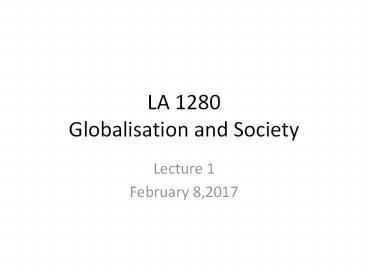GLOBALISATION - PowerPoint PPT Presentation
Title:
GLOBALISATION
Description:
1st of globalisation – PowerPoint PPT presentation
Number of Views:298
Title: GLOBALISATION
1
LA 1280Globalisation and Society
- Lecture 1
- February 8,2017
2
How do we explain this?
3
https//qz.com, Jan 16, 2017
4
(No Transcript)
5
(No Transcript)
6
- The journey of a T-shirt!
7
Journey Of a T shirt
Photo- http//shirahime.ch/2010/10/a-t-shirt-that-
means-the-world/
8
Routes travelled by a piece of cotton
- Picked from Texas
- Shirt made in China
- Second-hand selling in Tanzania
- Lobbyists in Washington DC
- Shops in New York
9
Globalisation from a social perspective
- (predominantly) Qualitative approach
- Data - through surveys, interviews, fieldwork
- Analysis- critical (NOT criticize)
- Look at an issue from multiple perspectives
- Focus on disadvantaged and marginal groups
- Explore issues at both macro and micro level
10
(No Transcript)
11
What is Globalisation?
- Is it a process?
- Does it have a clear beginning and an end?
- Is it only in one form or is it multiple?
- Should we say globalisations?
- Is it only about business? And money and stocks
etc? - Is the world really flat?
- Is the movement one way or cyclical?
- Is globalization also about non-economic
transactions? - Has globalisation failed?
12
In this course, we will look at
- How globalization occurs
- How does it impact peoples everyday lives?
- How do peoples behaviours influence the process?
- Its effect on the environment
- Empirical data
13
Assessment
- Attendance- 10
- (Non-academic) Journal article on a topic- 20
- Analysis of one globalised material object-20
- Final Exam- 50 (March 22nd)
14
(No Transcript)
15
Is globalisation new?
- Voyages across the world- Marco Polo, Ibn
Battuta, Columbus, Magellan - Silk Road- From Antioch (Turkey) to China, via
Iran, Afghanistan and Central Asia - Rise of empires
16
Eric Wolf. Europe and the people without history.
17
http//www.silkroadproject.org/tabid/177/defaul.as
px
18
A brief history
- Production among indigenous peoples-
kin-ordered (Eric Wolf) - Feudalism in Europe- 11th century
- Western form of Capitalism- 16th century
- Crusades- 11th-13th century
- Discovery of the New World
- Colonialism- colonies and empires
- Industrial revolution- 18th century
- Wage labour- work as commodity
- Money- universal value
- Property as private
- Slave trade and Plantations (coffee, sugar,
cotton)
18000 tons of silver and 200 tons of gold into
Spain from 1521-1600
19
Some definitions
- Time-space compression- David Harvey, 1989
- Widening, deepening, and speeding up of
world-wide interconnectedness in all aspects of
contemporary social life, the cultural to the
criminal, the financial to the spiritual- Held
(1999) - A spatio-temporal process of change that links
local or national social relations and networks
with worldwide global ones and thereby transforms
the organisation of human affairs- Assayag and
Fuller (2005)
20
- Contemporary Globalisation is the increasing
flow of trade, finance, culture, ideas, and
people brought about by the sophisticated
technology of communications and travel and by
the worldwide spread of neoliberal capitalism,
and it is the local and regional adaptations to
and resistances against these flows - - Lewellen, 2010, p.8
21
Harveys view of Globalisation
- Globalisation shrinking of space and
shortening of time- David Harvey - After 1970s- Post-Fordist regime of flexible
accumulation - Decrease turnover time
- Infrastructure and Communications
- Turnover of goods and capital
- 24/7 work culture
- Food packaging
- Recreation and leisure activities
22
David Harvey, 1992 The condition of postmodernity
23
Eugene Staley, 1939 World Economy in Transition
24
Giddens view of globalisation
- Time-space distanciation
- Impact of globalization on social relations
- Relationship possible in presence and absence
- Interlocking of global and local
- Globalisation defined as
the intensification of worldwide social relations
which link distant localities in such a way that
local happenings are shaped by events occurnng
many miles away and vice versa"
25
- Globalization as a concept refers both to the
compression of the world and the intensification
of consciousness of the world as a whole . . .
both concrete global interdependence and
consciousness of the global whole in the
twentieth century - -Roland Robertson 19928
26
Global and Local
- Roland Robertson- 'glocalisation'
- Appadurai- local a 'phenomenological property of
social life' - Burawoy- 'Global ethnography' ethnographys
concern with concrete, lived experience can
sharpen the abstractions of globalization
theories into more precise and meaningful
conceptual tools
27
Cultural Homogenisation
- Ritzer- Mcdonaldisation (1993)
- Hyper-consumerism
- Western uniformity
- Globalisation of nothing
28
Summary
- Globalisation is about
- Speeding up
- intensification of links
- stretching of social, economic and political
practices - heightened entanglement of global and local
- -Inda and Rosaldo, The Anthropology of
Globalisation, 2002
29
Cultural Impact of Globalisation
- Culture- a system of shared meanings
- Importance of roots- territorial
- Challenge of global to locality
- world of culture in motion
- Therefore, need to look at culture as
simultaneously deterritorialised and
reterritorialized - Convergence of styles- homegenisation
(Westernization) - cultural imperialism
- Locate human agency
- Is globalization unidirectional?
- Possibilities provided by movement
- World as a dislocated cultural space
- -Inda and Rosaldo, 2002
30
- Fridays class- cancelled (GATE duty)
- Will be rescheduled































